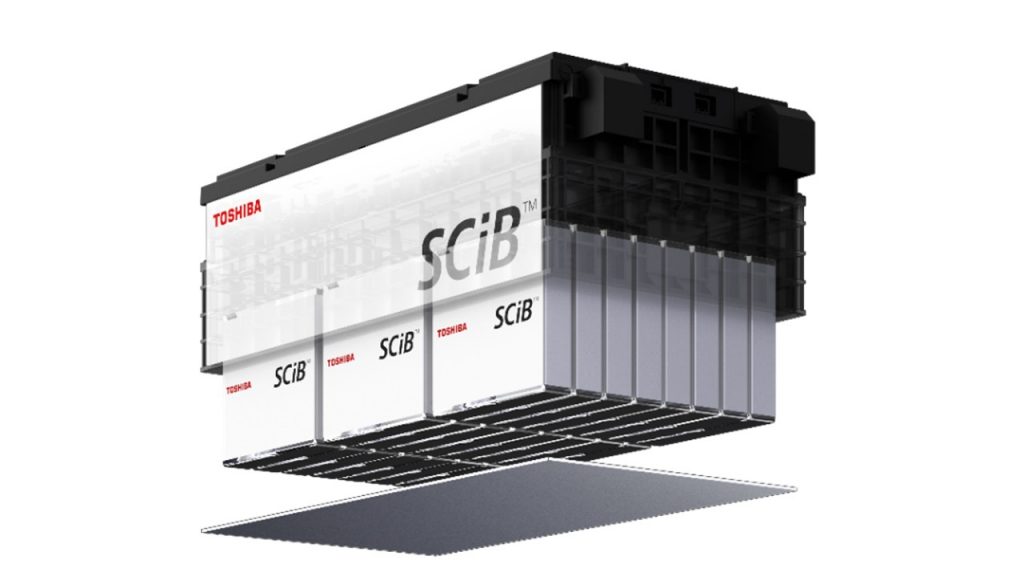Toshiba Corporation has launched a new SCiB™ module, a lithium-ion battery designed for use in EV buses, electric ships, and stationary applications. The new product features an aluminum baseplate that dissipates approximately twice the heat of current modules. It will be available from mid-April 2025, in Japan and internationally.
Use of lithium-ion batteries is increasing and diversifying, and there is growing demand for batteries that can support constant rapid charging and discharging in applications as diverse as electric buses and power load leveling in stationary applications. However, constant input and output at high power levels in a short time generates life shortening heat in the batteries. The challenge for battery developers is to manage heat dissipation and maintain battery life while realizing high power input and output in a short time.
Toshiba’s SCiB™ rechargeable batteries have a lithium titanate negative electrode that realizes safe operation, a long life, low temperature performance, fast charging, high input and output, and a wide effective state of charge (SOC*1). They are widely used in hybrid vehicles and industrial applications, including electric buses, cranes, trains, and automated guided vehicles in logistics centers. In addition to battery packs and cells, Toshiba also offers battery modules that can be connected in series or in parallel connnections to meet required voltages and capacities
Users of module products want a balance between constant high input and output in a short time and battery life. Toshiba has met this increasing demand with a new module that is the first to feature an aluminum baseplate. Aluminum is an excellent conductor, and the new module dissipates heat at approximately twice the rate of current battery modules.
Aluminum has a lower the thermal resistance than the resin materials usually used in baseplates. However, as it is a conductor, the baseplate must be insulated from the battery cells. Toshiba has developed a novel structure that achieves the required voltage resistance, allowing commercialization. When used with the same cooling system normally applied by customers, and under typical operating conditions, heat dissipation performance is approximately double that of current modules, significantly extending battery life.
Adding new products to its module lineup allows Toshiba to respond flexibly to customer demands and application requirements. Toshiba will continue to offer products that leverage the unique features of its SCiBTM lithium-ion battery, while fully considering customer lifecycle costs, from installation to maintenance and disposal.
| Product name | Type4-23 (FM01202CCB04) | Current | 160 A (continuous), 350 A (30 sec) |
| Dimensions | 203.8(W) × 395(D) × 134.2(H) mm | Ambient operating temperature | -30 to 50 ℃ |
| Weight | Approx. 16.5 kg | Major built-in function | Cell voltage measurement, module temperature measurement, cell balancing*2 and communication |
| Rated capacity | 45 Ah (1,242 Wh) | Voltage range | DC18.0 to 32.4 V |
| Nominal voltage | 27.6 V | Cell configuration | 2 in parallel × 12 in series (24 pcs of 23Ah cells) |
The battery module will be certified under the UL1973 safety standard for stationary applications, including off-grid applications and microgrids.
Click here for more product information
Tags: Electric Ships, EV battery, Japan, Toshiba



Recent Posts
EST-Floattech Expands Octopus Series with Lithium Iron Phosphate Battery Modules
PowerCell’s Marine System 225 receives Type Approval from Lloyd’s Register
Echandia Secures SEK 325 Million in Funding to Advance Maritime Electrification
Scotland’s Largest Maritime Decarbonisation Project Launches at Port of Aberdeen
Fortescue, GH2, and Trovio Complete First Digital Fuel Certificate Pilot for Ammonia Bunkering in Rotterdam
Fortescue Recognised as Global Leader in ‘Real Zero’ Climate Action
Bureau Veritas Urges Rethink of Maritime Finance and Operations in New Book on Sustainable Blue Economy
APM Terminals Pier 400 Deploys Largest Electric Terminal Tractor Fleet at Port of Los Angeles